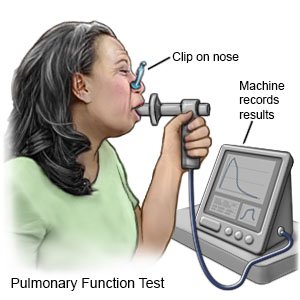Pulmonary Arterial Hypertension
Medically reviewed by Drugs.com. Last updated on Apr 2, 2024.
Pulmonary arterial hypertension (PAH) is a condition that increases blood pressure in your pulmonary artery. The pulmonary artery is the large blood vessel that brings blood from your heart to your lungs.
WHILE YOU ARE HERE:
Informed consent
is a legal document that explains the tests, treatments, or procedures that you may need. Informed consent means you understand what will be done and can make decisions about what you want. You give your permission when you sign the consent form. You can have someone sign this form for you if you are not able to sign it. You have the right to understand your medical care in words you know. Before you sign the consent form, understand the risks and benefits of what will be done. Make sure all your questions are answered.
Keep the head of your bed raised to help you breathe easier.
You can also raise your head and shoulders on pillows or rest in a reclining chair. If you feel short of breath, let healthcare providers know right away.
A pulse oximeter
is a device that measures the amount of oxygen in your blood. A cord with a clip or sticky strip is placed on your finger, ear, or toe. The other end of the cord is hooked to a machine.
Medicines:
- Blood thinners prevent blood clots. They may make you bruise or bleed more easily. Use a soft toothbrush and an electric shaver to prevent bleeding.
- Diuretics help your body get rid of extra fluid and protect your heart from more damage. You may urinate more often while you are taking diuretics.
- Vasodilators improve blood flow by making the vessels in your heart and lungs wider. These may be given as a pill, an inhaler, or in your IV.
Tests:
- Blood tests may be used to monitor your condition.
- A blood vessel test may be used to measure the pressure in your pulmonary artery before and after medicine is given.
- An EKG may be used to check for damage or problems in your heart. A short period of electrical activity in your heart is recorded.
- An x-ray, echocardiogram, CT, or MRI may be used to show the structure, movement, and blood vessels of your heart. You may be given contrast liquid to help healthcare providers see the pictures better. Tell healthcare provider if you have ever had an allergic reaction to contrast liquid. Do not enter the MRI room with anything metal. Metal can cause serious injury. Tell healthcare providers if you have any metal in or on your body.
- Cardiac catheterization is a procedure used to look for or treat a heart condition. A catheter is inserted in your arm, neck, or groin and moved into your heart. Contrast liquid is injected into an artery and x-rays of your blood flow are taken. Tell a healthcare provider if you have ever had an allergic reaction to contrast liquid.
- Pulmonary function tests (PFTs) help healthcare providers learn how well your body uses oxygen. You breathe into a mouthpiece connected to a machine. The machine measures how much air you breathe in and out over a certain amount of time. PFTs help your healthcare providers decide the best treatment for you.

- A ventilation and perfusion (VQ) scan takes pictures of your lungs. During the perfusion part of the test, contrast liquid will be given through an IV. This liquid helps the blood flow in your lungs show up clearly on the monitor. During the ventilation part, you will breathe in a medical gas. Pictures will be taken to see how well your lungs take in oxygen. Tell a healthcare provider if you have ever had an allergic reaction to contrast liquid.
Treatment:
- You may need extra oxygen if your blood oxygen level is lower than it should be. You may get oxygen through a mask placed over your nose and mouth or through small tubes placed in your nostrils. Ask your healthcare provider before you take off the mask or oxygen tubing.
- Surgery may be used to help blood flow from one part of the heart to another. You may need lung or heart transplant surgery if other treatments do not work and your condition is severe.
Treatment options
The following list of medications are related to or used in the treatment of this condition.
RISKS:
You may develop a blood clot, heart failure, or a lung infection. Any of these can become life-threatening. PAH can be dangerous for a pregnant woman and to her unborn baby.
CARE AGREEMENT:
You have the right to help plan your care. Learn about your health condition and how it may be treated. Discuss treatment options with your healthcare providers to decide what care you want to receive. You always have the right to refuse treatment.© Copyright Merative 2024 Information is for End User's use only and may not be sold, redistributed or otherwise used for commercial purposes.
The above information is an educational aid only. It is not intended as medical advice for individual conditions or treatments. Talk to your doctor, nurse or pharmacist before following any medical regimen to see if it is safe and effective for you.
Learn more about Pulmonary Arterial Hypertension
Treatment options
Care guides
Medicine.com guides (external)
Further information
Always consult your healthcare provider to ensure the information displayed on this page applies to your personal circumstances.
